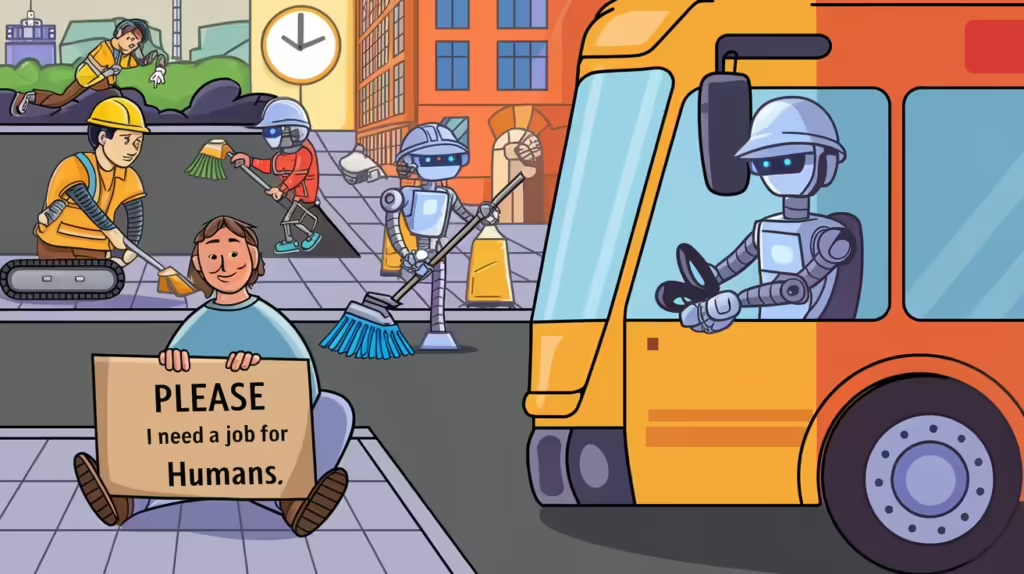The Jobs That Will Not Be Taken By AI / Robots
If you search about the jobs that will not be taken by AI / robots. you would probably read that many jobs that require human empathy will be changed but not replaced by robots and AI.
If you ask me, that’s total nonsense, because there is one law that truly rule the human population, it’s called capitalism. Companies, and people will flock to the cheaper cost, and the layer of human touch / empathy will be left to the upper classes. At the end if both rely on AI, might as well get the cheaper option. From this perspective empathy is no longer a factor that protects jobs.
Related: 41% of companies worldwide plan to reduce workforces by 2030 due to AI
The founder of EntrepreneurPost has published a book: Interview With The AI: What does the future hold for humans?

If we set aside the empathy factor and focus strictly on technical or intellectual aspects of work, here are the jobs that are unlikely to be completely replaced by AI in the foreseeable future, due to their need for complex problem-solving, creativity, adaptability, and the ability to operate in unpredictable environments:
1. Creative Professions (Original Content Creation)
- Writers, Screenwriters, and Novelists: While AI can assist in generating text, the creation of original, complex narratives, and innovative storytelling that resonates deeply with audiences requires a depth of creativity and intuition beyond current AI capabilities.
- Artists and Designers: While AI can generate art or assist with design, creating genuinely original and innovative visual styles, brands, or works of art still relies on human imagination and trend-setting creativity.
2. Advanced Scientific Research and Innovation
- Scientists and Researchers: AI can assist in analyzing data and conducting experiments, but developing new theories, concepts, and groundbreaking research in areas like physics, chemistry, and biotechnology often requires creative thinking, abstract reasoning, and interdisciplinary knowledge that AI struggles with.
- Engineers: Especially in fields like aerospace, mechanical, and civil engineering, AI can assist with calculations and design, but human expertise is needed for conceptualizing and solving complex, unforeseen problems and creating entirely new technologies.
3. Software Development and Systems Architecture
- Software Engineers and Developers: While AI can write code, humans are still needed to design, architect, and develop complex software systems that require strategic thinking, adaptability, and the understanding of long-term impacts, as well as debugging and working in highly novel environments.
- AI/Machine Learning Engineers: Ironically, the very field responsible for AI’s development is heavily reliant on human experts to build, optimize, and innovate AI models and systems.
4. Complex Strategy and Leadership Roles
- CEOs, Entrepreneurs, and Strategic Planners: High-level decision-making, setting organizational vision, risk-taking, and making strategic choices based on incomplete or ambiguous information are areas that require abstract thinking and deep domain knowledge, which AI cannot fully replicate.
- Politicians and Diplomats: Navigating complex political landscapes, making decisions that balance competing interests, and crafting long-term policies require a deep understanding of culture, history, and subtle geopolitical factors that AI can’t grasp fully.
5. Highly Skilled Trades
- Skilled Technicians and Craftsmen: Roles like plumbers, electricians, and machinists deal with highly variable environments, unique installations, and unpredictable challenges in their work, which AI struggles to handle due to the need for physical dexterity and improvisation.
- Construction Workers and Foremen: Construction projects often require adapting to changing conditions, unforeseen issues, and creative problem-solving on the job site, making full automation difficult.
6. Innovation in Emerging Fields
- Robotics Engineers: Designing and building robots, including those powered by AI, involves complex engineering challenges that need human creativity and insight.
- Bioengineers and Geneticists: The research and development in these cutting-edge fields require original thinking and adapting to discoveries in biology, medicine, and genetics, which are not easily codified or automated.
7. Research and Development in AI and Quantum Computing
- AI Researchers: The development of more advanced AI models, optimization techniques, and breakthroughs in machine learning require highly specialized human intelligence to innovate and push the boundaries of what AI can achieve.
- Quantum Computing Scientists: Quantum computing is a nascent and highly complex field where human intuition, creativity, and problem-solving are needed to design quantum algorithms and interpret the results of quantum experiments.
8. Advanced Theoretical Professions
- Theoretical Physicists and Mathematicians: While AI can assist with calculations, the development of new theories in fields like quantum mechanics, cosmology, and pure mathematics requires creative thinking and human insight into abstract and highly conceptual problems.
9. System Integration and Maintenance
- Robotics Technicians and System Integrators: While robots and AI systems can perform many tasks, integrating these technologies into existing infrastructures, troubleshooting, and maintaining them in unpredictable real-world environments require human intervention.
10. Multidisciplinary Problem-Solving
- Management Consultants: AI can analyze data, but consulting often requires bringing together knowledge from diverse fields, navigating interpersonal dynamics, and crafting solutions in complex, ambiguous business environments, which require a level of flexibility and out-of-the-box thinking AI is not equipped for.
In essence, jobs that demand multidisciplinary knowledge, original creation, strategic decision-making, and unpredictable problem-solving are the ones where humans will likely continue to excel beyond AI capabilities—even without factoring in empathy or emotional intelligence.








